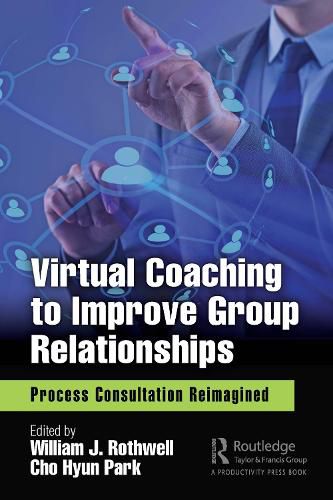Readings Newsletter
Become a Readings Member to make your shopping experience even easier.
Sign in or sign up for free!
You’re not far away from qualifying for FREE standard shipping within Australia
You’ve qualified for FREE standard shipping within Australia
The cart is loading…






Process consultation, invented by Edgar Schein, is both a skill and an organization development change effort. As a skill, process consultation means the ability to observe and provide feedback about small group dynamics to a work group about how well group members interact and how to improve that interaction. Just as facilitators devote their time to (in one word) asking, process consultants devote their time to (in one word) watching-at an expert level. As a change effort, process consultation is a concerted effort to help members of a group work together more effectively. For that reason, the word process in this context should be interpreted to mean interpersonal interaction in small groups.
Historically, process consultation has focused attention on face-to-face groups and their group dynamics. But times are changing. More work is done online or in blended (online and onsite) groups than face-to-face alone. A 2017 survey of over 25,000 workers in 12 countries revealed that 62% of global workers are now working flexibly-with some residential work and some virtual work. The same survey found that workers believe that flexible work arrangements make them more productive and that 48% of survey respondents reported that their virtual interactions include representatives of other cultures. It is true that, for workers who can discipline themselves and manage distractions at home, virtual work can be more productive when commuting time is eliminated and workplace distractions are minimized. Virtual work has the advantage of reducing the need for childcare, slashing work wardrobe costs, and cutting unproductive, stressful commuting time.
Despite how modes of working together have changed over the years-ranging from face-to-face to some degree of virtual (video conference, audio conference, print-only collaboration, and many blended combinations)-and the growing need for finding ways to help people work together more effectively, there has been no practical guideline of process consultation in a virtual or mixed work setting since Schein’s process consultation initially focused on group dynamics in face-to-face settings. Therefore, this book aims to provide practical approaches to process consultation, helping group members discover more effective ways of working together in blended virtual/residential and cross-cultural settings.
Essentially, this book provides a practical, how-to guide for virtual coaching, using step-by-step procedural approaches, cases, and helpful platforms/technologies and tools. It also provides information about how to use technology to support the process of improving virtual or mixed group relationship.
$9.00 standard shipping within Australia
FREE standard shipping within Australia for orders over $100.00
Express & International shipping calculated at checkout
Process consultation, invented by Edgar Schein, is both a skill and an organization development change effort. As a skill, process consultation means the ability to observe and provide feedback about small group dynamics to a work group about how well group members interact and how to improve that interaction. Just as facilitators devote their time to (in one word) asking, process consultants devote their time to (in one word) watching-at an expert level. As a change effort, process consultation is a concerted effort to help members of a group work together more effectively. For that reason, the word process in this context should be interpreted to mean interpersonal interaction in small groups.
Historically, process consultation has focused attention on face-to-face groups and their group dynamics. But times are changing. More work is done online or in blended (online and onsite) groups than face-to-face alone. A 2017 survey of over 25,000 workers in 12 countries revealed that 62% of global workers are now working flexibly-with some residential work and some virtual work. The same survey found that workers believe that flexible work arrangements make them more productive and that 48% of survey respondents reported that their virtual interactions include representatives of other cultures. It is true that, for workers who can discipline themselves and manage distractions at home, virtual work can be more productive when commuting time is eliminated and workplace distractions are minimized. Virtual work has the advantage of reducing the need for childcare, slashing work wardrobe costs, and cutting unproductive, stressful commuting time.
Despite how modes of working together have changed over the years-ranging from face-to-face to some degree of virtual (video conference, audio conference, print-only collaboration, and many blended combinations)-and the growing need for finding ways to help people work together more effectively, there has been no practical guideline of process consultation in a virtual or mixed work setting since Schein’s process consultation initially focused on group dynamics in face-to-face settings. Therefore, this book aims to provide practical approaches to process consultation, helping group members discover more effective ways of working together in blended virtual/residential and cross-cultural settings.
Essentially, this book provides a practical, how-to guide for virtual coaching, using step-by-step procedural approaches, cases, and helpful platforms/technologies and tools. It also provides information about how to use technology to support the process of improving virtual or mixed group relationship.